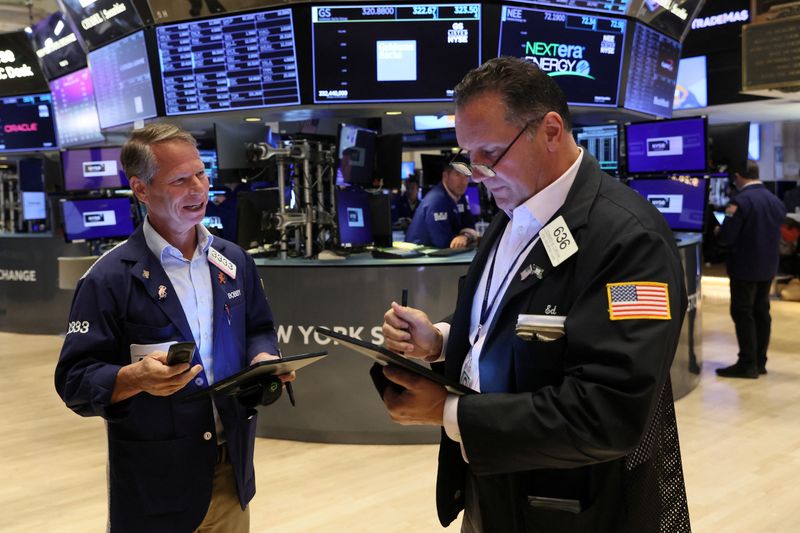Futures rise, tech earnings this week, oil slips – what’s moving markets

Investing.com — Stock futures on Wall Street rose on Monday ahead of a busy week highlighted by key earnings, monthly nonfarm payrolls figures, and the final frantic days of campaigning before the US presidential election on Nov. 5. Several technology titans are due to report their latest quarterly returns this week, in a potential test of the staying power of a recent rally in equities. Meanwhile, crude prices slump after an Israeli attack on Iran over the weekend avoided oil and nuclear facilities.
1. Futures rise
US stock futures pointed higher on Monday, as investors looked ahead to quarterly earnings from megacap technology names later this week, geared up for a key employment report, and braced for upheaval around the upcoming knife-edge US election.
By 04:30 ET (08:30 GMT), the Dow futures contract had added 178 points or 0.4%, S&P 500 futures had gained 30 points or 0.5%, and Nasdaq 100 futures had risen by 135 points or 0.7%.
The benchmark S&P 500 has jumped by around 22% this year, sparking concerns over elevated valuations in US equity markets that could be vulnerable to short-term ructions. According to LSEG data cited by Reuters, the S&P 500’s price-to-earnings ratio — a gauge of earnings estimates for the next 12 months — stands at 21.8, close to the highest level in more than three years.
Whether valuations will remain at these heights is a major question facing investors, particularly as they prepare for the confluence of several potentially market-moving events in the coming days.
2. Tech earnings ahead
This week will see the release of quarterly returns from a string of tech industry titans, which could heavily influence the direction of markets.
Although shares in industrial and financial firms have recently helped broaden out the gains in stocks, the biggest tech players have been the most powerful drivers of a push higher in markets to record levels. The so-called Magnificent Seven tech groups are tipped to account for almost all of the earnings growth from the S&P 500 in the third quarter, according to FactSet data cited by The Wall Street Journal.
Meanwhile, commentary from these companies around artificial intelligence could sway how analysts are assessing a spike in investment in the nascent technology, with some strategists worrying that the heavy spending may not lead to immediate returns.
Of the Magnificent Seven firms, Google-parent Alphabet (NASDAQ:GOOGL), software giant Microsoft (NASDAQ:MSFT), Instagram-owner Meta Platforms (NASDAQ:META), iPhone-maker Apple (NASDAQ:AAPL) and e-commerce behemoth Amazon (NASDAQ:AMZN) are all due to report this week. Electric carmaker Tesla (NASDAQ:TSLA) posted better-than-expected earnings last week, while AI-darling Nvidia (NASDAQ:NVDA) is set to unveil its latest figures on Nov. 20.
3. McDonald’s says beef patties not the source of E. coli outbreak
McDonald’s said over the weekend that beef patties were not the source of an E. coli outbreak stemming from its Quarter Pounders burgers that killed one person and sickened almost 75 others across multiple US states.
In a statement, the fast-food chain’s North America Chief Supply Chain Officer Cesar Piña noted the “issue appears to be contained to a particular ingredient and geography,” adding “we remain very confident that any contaminated product related to this outbreak has been removed from our supply chain and is out of all McDonald’s (NYSE:MCD) restaurants.”
The Colorado Department of Agriculture also said subsamples from McDonald’s fresh and frozen beef patties had all tested negative for E. coli. Testing has been completed and no further samples are expected to received, the department said.
McDonald’s is now set to resume distribution of fresh supplies for the Quarter Pounder, with the offering anticipated to be available once again in all restaurants in the coming week, the company said.
Shares in the group slipped last week after the Centers for Disease Control and Prevention flagged the health ramifications of the E. coli infections linked to the Quarter Pounder.
4. Yen weakens as Japanese election dampens rate hike bets
The Japanese yen was one of the worst performing currencies in Asia on Monday, with its pair with the US dollar rising to its highest level since late-July.
The yen was battered by local media reports showing a coalition led by Japan’s ruling Liberal Democratic party did not win a majority in the parliamentary elections held on Sunday. The LDP will now have to seek coalitions with smaller regional parties to retain power — a scenario that presents a more fractured political outlook for Japan.
Traders were betting that the increased political uncertainty will keep the Bank of Japan from hiking interest rates further, weighing on the yen.
5. Oil dips
Oil prices fell sharply Monday after Israel’s retaliatory strike on Iran over the weekend avoided Tehran’s oil and nuclear facilities, easing geopolitical tensions in the Middle East.
By 04:31 ET, the Brent contract dropped 4.5% to $72.23 per barrel, while U.S. crude futures (WTI) traded 4.8% lower at $68.34 per barrel.
Traders had feared that any attacks on Iran’s oil and nuclear infrastructure would mark a dire escalation in the conflict, potentially disrupting oil supplies from the crude-rich region. Iran downplayed the impact of the attack, but still threatened retaliation.
The strike caused some investors to price out a risk premium from crude prices, putting the focus squarely back on demand, which is expected to weaken in the coming months.
(Reuters contributed reporting.)







